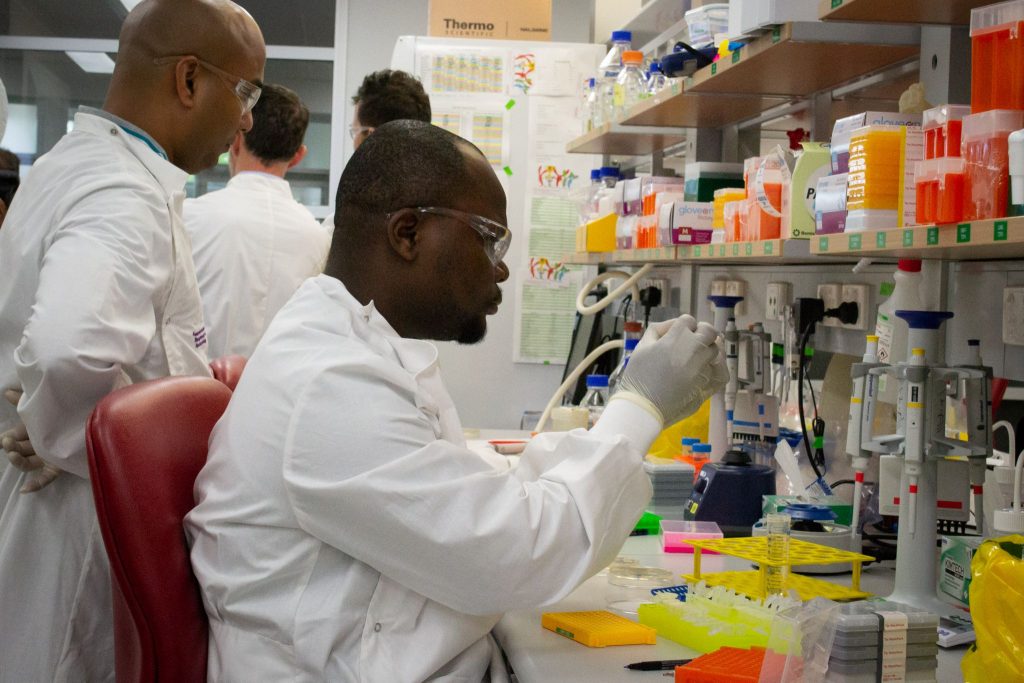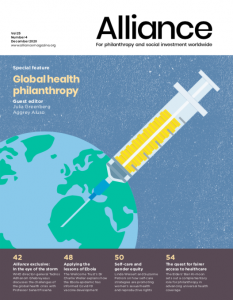With an endowment of £26 billion, the UK’s Wellcome Trust is the fourth biggest foundation in the world. As one of the leading funders of global health, it has been at the forefront of efforts to address the Covid-19 pandemic. Drawing on decades of experience funding research and science Wellcome recently announced a new approach for how it plans to help solve some of the biggest health threats facing people across the world.

Ed Whiting, Wellcome Trust Director of Strategy.
Ahead of Alliance magazine’s December issue focusing on global health, Wellcome’s Director of Strategy Ed Whiting joined our Digital and Executive editors to talk about the foundation’s new strategy, its place in the health and research funding world, and why the issues of global heating and mental health will be far more central to its future work.
Alliance: The Wellcome Trust recently launched its new strategy which involves a focus on three main areas: infectious diseases, mental health and global heating. Could you tell us a little bit about the thinking behind that choice?
Ed Whiting: We’ve been really thinking about what the place of Wellcome is in the world, how is the world changing, and how has Wellcome changed. We talked to a number of people around the world – funding partners or those who we know in big academic institutions, but also people in countries that we don’t fund much or in communities we haven’t engaged with a huge amount. And a couple of things that came out really strongly is that we need to use our independence, and we need to use the perspective that we have because we work in lots of different fields at once: discovery, translation, policy, advocacy, public engagement, and all sorts of other things. And our potential value in the world is bringing those things together. On the focus areas, when we talked to people around the world, when we looked at the burden of disease and all sorts of other indicators, it felt to us – and it’s a judgement call – that what really jumped out were escalating risks of infectious disease, mental health problems, and the way global heating is changing health.
Could you tell us how much Wellcome is planning to spend in these three areas?
We deliberately haven’t worked that out yet, because the first thing to note about all of this is we currently spend dramatically different proportions of our money between those different challenges. So rather than saying ‘let’s stop our budget today and create a magical alignment of all these three around equal portions’, we thought let’s start with what we’ve got. And then what we’re doing at the minute is plotting out how this trajectory may change over time, because also the size of the pie that we have to play with changes according to how our endowment performs too, so it’s not even a stable denominator.
When we talked to the people that we work with, they were saying ‘I’m very happy that you fund my work in fundamental biology, but if we’re all going to burn up in the next 30 years because the climate is overheating and Wellcome does nothing about it, then you will not be fulfilling the responsibility that you have as a large research funder, so you must address this challenge.’ We agreed with that.
Let’s take a look at some of these new focus areas in a bit more detail, starting with mental health. It’s a very broad field, and I’m wondering where Wellcome feels it can have the most impact?
What we’re going to do in mental health starts with the programme that we launched last year to look at particularly anxiety and depression. We’re going to broaden that programme, potentially drawing in other conditions, and potentially broadening out the portfolio science that we support. But the core proposition is the same: that it’s about research and about mental health science.
We have fields of mental health that don’t always work together as well as they might do. While in say cancer oncology, you have very common terminologies, a sense of shared endeavour, real intersection and sharing between different expertise; in mental health that doesn’t work as well. When you look at neuroscience, psychology, psychiatry, often it’s very hard to get a sense of a shared endeavour. So, what we’re doing is reconstructing the way that we fund around what we’re calling the ‘active ingredients’, or common ingredients of mental health that may be equally applicable in those different fields. Then we’re going to try and fund those fields to come together a bit better. And to do that – rather than getting hung up on cause and debating why people suffer what they suffer – we’ll start with the experience, and we say what are people feeling and experiencing?
With mental health, the conversation is at really different places in different parts of the world. How will your strategy account for engaging with these different cultural norms? Is that something Wellcome has been thinking about?
We have a network of advisers – lived-experience advisers who are experts and are from very different cultural contexts from around the world – and we’re relying on them to bring that experience into our work so we can understand it better. We know we need to do a better job on it, and our strategy is built around a clearer sense that these urgent health challenges don’t affect everyone equally. We’re humble about our own starting point. We know that we have been very UK oriented, and we’re not as diverse an organisation as we would like to be. We know the work to do to get those experiences into our work, we’re trying to just think through how we’ll do that over time. But certainly, as we go, having a much richer appreciation of cultural community contexts and learning from experience will be a much bigger part of our work.

Credit: University of Queensland
With your focus on infectious diseases, has Wellcome identified particular diseases as some of the biggest threats to focus on or are you looking at the field more broadly? What is the strategy that you’re taking there?
We’re going to look for where science and research can make the biggest difference in tackling infectious disease. And for Wellcome, we’re really interested in those diseases that are escalating in the risk and the burden. So obviously, we see around us epidemics and the challenges around epidemics. We’re very active on Covid-19 as you know and in setting up CEPI [Coalition for Epidemic Preparedness Innovations]. Similarly, AMR [anti-microbial resistance] is on a trajectory that is frankly terrifying. So, we will equip ourselves to be as active as we can on that. I think there are then other diseases and issues that we are very concerned about when you look around the world like enteric diseases and artemisinin resistant malaria in Asia. We’ve already funded lots of research and work on those diseases, and while we haven’t defined our portfolio yet for the long-term, the key things we’ll be looking for is where can we use science research and new knowledge that will help to take a disease that is escalating and bend that curve so that we fewer people suffer from it.
Let’s turn to global heating. Why has Wellcome chosen to focus on global heating and also label it as global heating? Could you tell us more about how you identified this area?
When we went around the world and talked to the people that we work with, they were saying ‘I’m very happy that you fund my work in fundamental biology, but if we’re all going to burn up in the next 30 years because the climate is overheating and Wellcome does nothing about it, then you will not be fulfilling the responsibility that you have as a large research funder, so you must address this challenge.’ We agreed with that, and we thought that we needed to structure and prioritise this work in a much greater way than we have in the past.
While we haven’t defined our portfolio yet for the long-term, the key things we’ll be looking for is where can we use science research and new knowledge that will help to take a disease that is escalating and bend that curve so that we fewer people suffer from it.
We thought that global heating is the force that is leading to so many of the changes that we see in health around the world. So what we wanted to do is to base the programme on something that we know is affecting health today and will in the future, but then also think about where science can help us to understand and reckon with this challenge – and that’s around changing infectious disease patterns, what it does to our own bodies and our own make up, and how public health systems can better grapple with, anticipate and mitigate the effects of this changing planet that we’re living on.
On the labelling, we are sensitive in listening to the policy community which has quite rightly been saying, look let’s give this a much clearer term, the world is heating up; rather than using the sometimes the more benign phrasing of global warming.
With climate funding, I know in the past – and this news is from five years ago and it may be that things have changed for the Wellcome Trust since then – but Wellcome has been criticised for its decision to stay invested in fossil fuels. With your new focus on global heating, is this going to change? Has it already?
Our position remains that we’ve chosen to be an active shareholder. So, we choose to engage with the companies that we invest in, in order to enable them to be a responsible citizen in the world. That has involved both being an active shareholder in a fossil fuel company that was going through a transition to renewables where we’ve been an active agent behind the scenes, but has also at times involved us divesting from companies where we haven’t seen a pathway, a trajectory towards a more sustainable approach to use of energy. We feel there has been benefits from being in the room and arguing for a pathway that you wouldn’t necessarily get if you do the one-time divestment and are outside of it. So, the position we’ve taken is to be in the room – we know that that’s not something that everyone agrees with. And it’s something that we continue to debate inside Wellcome, but it is about also trying to be an agitator for a more sustainable pathway for the future as well.
Could you share any examples of what it has meant for Wellcome to be inside the room and have influence as an active shareholder?
I think there have been times when Wellcome has been an investor in a company that has moved to setting out its own net-zero trajectory, and our role has been to argue for that and to say as a shareholder that we would support a company doing that. Over the last few years, you’ve seen a number of companies that Wellcome has invested in moving towards net zero.

Credit: University of Queensland
With the new strategy, does this signal a shift for the Wellcome Trust from funding research to a greater focus on public policy?
I think I would say that we’ve been doing much more of the policy and advocacy work over recent years. I think if you look at Wellcome taking a really clear position, say, on Brexit in the UK, or on research culture, or on open research, or even on global co-operation and the work we’re doing with the WHO – the work to create CEPI a few years ago and right now the work around the act accelerator to generate new vaccines and therapeutics for Covid – it’s felt to me like we’ve been going through a journey. What the strategy now enables us to do is to integrate better. So, we’ve been doing more policy and advocacy. But in future, everything that we do in policy, advocacy, public engagement, and cultural engagement will support and integrate with these three big challenges, and that’s the difference. We’re going to integrate what we do better, and we’re going to focus it around those three challenges.
We wanted to ask about Wellcome’s goal of fostering international co-operation. Besides spending more money outside of the UK, what are the steps that you’re taking in this regard?
Over the last five years or so, we’ve stepped up the global strategic engagement with what we call counterpart organisations. They’re often organisations that can do things that we can’t or might have networks that we don’t have. For instance, we entered into official relations with the WHO as a non-state actor a few years ago. We now have a portfolio of shared interests with WHO where we’re working together, recognising the role the WHO has both as a global network and normative leader in health, but also where having a research-oriented organisation alongside them can help for us to get to answers that can spread faster and more effectively. We’re increasingly working with governments around the world, particularly through CEPI and the work on Covid. So basically, the big shift for us is thinking about the strategic partnerships in a more elevated way, so we can be clearer about what Wellcome is interested in and what we bring to the party. But also, we can say with other funders, other governments, other organisations: Where do our interests intersect and how should we work together? We’re doing more of that, and it’s going to be a much bigger part of what Wellcome does in the future. We want to be a reliable, creative, innovative partner for other people who also want to solve some of these big, urgent health challenges.
You’ve mentioned your relationship with governments and also your relationship with WHO, which has obviously had a challenging time recently, navigating the pandemic but also dealing with the impact of state funding cuts. This year the UK government committed to increase its funding of the WHO by 30 per cent. How much influence were you able to bring to encourage the government to take that step through your relationship both with the UK government and the WHO?
We’ve been entirely clear and open that we will argue for an effective WHO in any room we’re in. We’ve been absolutely clear with the British government and other governments that support and investment into the WHO, which it urgently needs, is absolutely critical. We were completely open about saying that to the British government, and we were delighted to see the increased investment. Equally we’ve been clear with the WHO that there’s always room for improvement and room for learning in the global response. We think the WHO has done many things brilliantly and better in this response than we’ve seen in others.
How important do you think the advocacy of your foundation and other philanthropic foundations like the Gates Foundation was to the UK government in taking this step and investing these extra resources?
I think you’d have to ask the British government that. What I hope is that foundations like ours can make an evidence-led and clear assertion of what we believe can help health, and that we can work with governments to make that happen. As you’d expect, we’d discussed with the British government and a number of other governments what that broader future agenda might look like to improve pandemic preparedness and investment into the sorts of things both scientifically and structurally that we need to learn from Covid to do a better job next time. So that’s been an incredibly active conversation with the British government and a number of others, and that’s exactly what I feel we should be doing as a foundation.
Elika Roohi is Digital editor at Alliance, and Charles Keidan is Executive editor.
Upcoming issue: Global health philanthropy 
Subscribe today to make sure not to miss it!
At £46 billion each year – almost a quarter of all grantmaking – philanthropy spends more on health-related causes than anything else. As the Covid-19 pandemic intensified, philanthropy provided critical funding for vaccine development, medical equipment, mutual aid, social welfare, and global health infrastructure. But there is intense debate about how the largest foundations interact with governments, international bodies and pharmaceutical companies and how they should be held accountable to citizens. This issue of Alliance considers new directions for global health philanthropy and explores whether health funding is going where its most needed. It is guest edited by Julia Greenberg, Director, Governance and Financing, Public Health program, Open Society Foundations and Aggrey Aluso, Manager of Health and Rights Program, Open Society Initiative for Eastern Africa.
Also in this issue: Head of Vaccines at the Wellcome Trust, Dr Charlie Weller discusses the Wellcome’s role in the race for a vaccine drawing on lessons from Ebola. Subscribe today!



Comments (0)